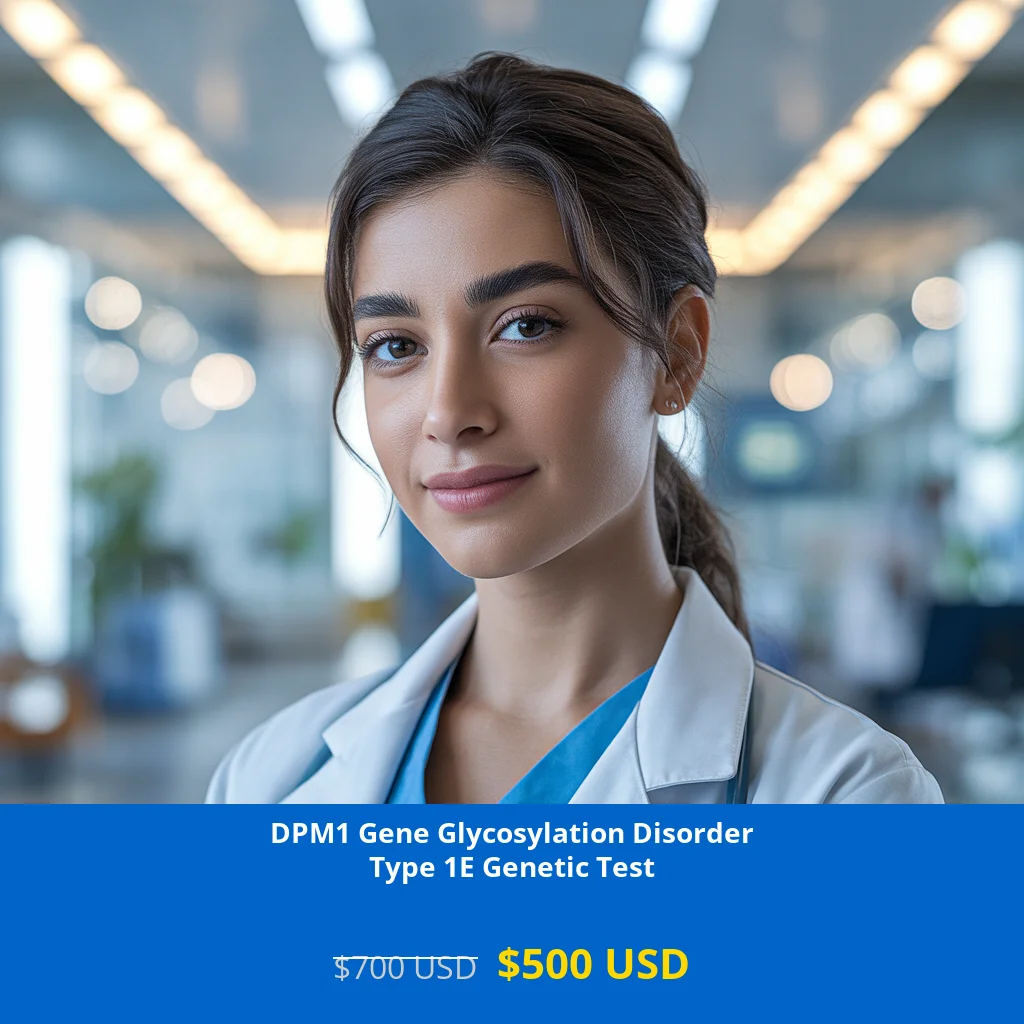DPM1 Gene Glycosylation Disorder Type 1E NGS Genetic DNA Test
Comprehensive Introduction to DPM1 Genetic Testing
The DPM1 Gene Glycosylation Disorder Type 1E NGS Genetic DNA Test represents a breakthrough in neurological genetic diagnostics, offering precise detection of mutations associated with congenital disorders of glycosylation. This advanced testing methodology utilizes next-generation sequencing technology to analyze the DPM1 gene, which plays a critical role in the glycosylation process essential for proper protein function and cellular communication.
Glycosylation disorders represent a group of inherited metabolic conditions that affect multiple organ systems, with neurological manifestations being particularly prominent. The DPM1 gene specifically encodes dolichol-phosphate mannosyltransferase, an enzyme vital for the synthesis of lipid-linked oligosaccharides. When mutations occur in this gene, they disrupt normal glycosylation pathways, leading to Type 1E congenital disorder of glycosylation (CDG-1E).
What This Advanced Test Measures and Detects
Our comprehensive NGS genetic DNA test specifically targets and analyzes:
- Complete sequencing of the DPM1 gene to identify pathogenic variants
- Detection of single nucleotide polymorphisms (SNPs) affecting enzyme function
- Identification of insertions, deletions, and missense mutations
- Assessment of copy number variations within the DPM1 genomic region
- Evaluation of genetic markers associated with disease severity and progression
The test employs state-of-the-art next-generation sequencing technology that provides unparalleled accuracy in detecting even the most subtle genetic variations. This comprehensive analysis enables healthcare providers to make informed decisions about treatment strategies and family planning.
Who Should Consider DPM1 Genetic Testing?
Clinical Indications and Symptoms
This test is particularly recommended for individuals presenting with:
- Unexplained developmental delays in infancy or early childhood
- Recurrent seizures or epilepsy of unknown origin
- Abnormal brain imaging findings, including cerebellar hypoplasia
- Muscle weakness, hypotonia, or movement disorders
- Visual impairment or retinal abnormalities
- Family history of congenital disorders of glycosylation
- Unexplained liver dysfunction or coagulation abnormalities
- Failure to thrive despite adequate nutritional support
Special Populations
The test is especially valuable for:
- Children with suspected inherited metabolic disorders
- Individuals with atypical neurological presentations
- Families planning pregnancy with known CDG history
- Patients with unexplained multisystem involvement
Significant Benefits of DPM1 Genetic Testing
Undergoing DPM1 genetic testing provides numerous advantages for patients and healthcare providers:
- Accurate Diagnosis: Provides definitive identification of CDG-1E, eliminating diagnostic uncertainty
- Personalized Treatment: Enables targeted therapeutic approaches based on specific genetic findings
- Family Planning Guidance: Offers crucial information for genetic counseling and reproductive decisions
- Proactive Management: Facilitates early intervention strategies to optimize developmental outcomes
- Research Contribution: Contributes to ongoing scientific understanding of glycosylation disorders
- Cost-Effective Care: Reduces unnecessary medical testing and procedures through precise diagnosis
Understanding Your Test Results
Interpretation Guidelines
Our comprehensive genetic report provides detailed analysis with clear interpretation:
- Positive Result: Indicates the presence of pathogenic variants in the DPM1 gene, confirming CDG-1E diagnosis
- Negative Result: Suggests absence of known disease-causing mutations in the DPM1 gene
- Variant of Uncertain Significance: Identifies genetic changes with unclear clinical implications requiring further evaluation
- Carrier Status: Detects individuals who carry one copy of a mutated gene but may not show symptoms
Clinical Implications
Positive results enable healthcare providers to:
- Implement specialized monitoring protocols for neurological complications
- Develop personalized rehabilitation and therapeutic interventions
- Provide accurate prognostic information to families
- Coordinate multidisciplinary care involving neurologists, geneticists, and metabolic specialists
Test Pricing and Availability
| Price Type | Amount (USD) |
|---|---|
| Discount Price | $500 |
| Regular Price | $700 |
Test Specifications
- Turnaround Time: 3 to 4 Weeks
- Sample Types Accepted: Blood, Extracted DNA, or One Drop Blood on FTA Card
- Testing Methodology: Next-Generation Sequencing (NGS) Technology
- Specialty: Neurological Genetics
Pre-Test Requirements
Before testing, we recommend:
- Comprehensive clinical history documentation
- Genetic counseling session to create detailed family pedigree
- Discussion of potential implications and limitations of testing
- Informed consent process explaining benefits and risks
Nationwide Accessibility and Booking
General Genetics Corporation maintains testing facilities across the United States, with convenient locations in all major metropolitan areas including New York, Los Angeles, Chicago, Houston, Phoenix, Philadelphia, San Antonio, San Diego, Dallas, and San Jose. Our network of certified genetic counselors and neurological specialists ensures comprehensive support throughout the testing process.
Ready to take the next step in understanding your genetic health? Book your DPM1 Gene Glycosylation Disorder Type 1E NGS Genetic DNA Test today by calling our dedicated genetic specialists at +1(267) 388-9828 or schedule your appointment through our secure online portal. Early detection through advanced genetic testing can provide life-changing insights and guide effective treatment strategies for neurological conditions.







